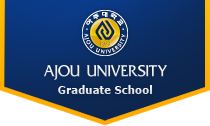1. Model Based Systems Engineering Research
MBSE Lab Professor : Jae-Chon Lee
Laboratory : Seongho Hall 242/243/244 Laboratory phone : 031-219-3949 website : http://mbse.ajou.ac.kr
This research is to improve the productivity of complex systems engineering. We hope to improve quality while improving designers’ productivity by an order of magnitude. An especially promising area involves research and development on technologies for model-driven systems engineering that can
- - analyze the requirements of a complex systems
- - model the features of the structures, behaviors, and constraints of hybrid systems
- - verify the behaviors and constraints of the models statically and dynamically
- - protect IP contained in the model elements so as to support concurrent engineering
- - optimize multi-core controller architectures using systems model execution analysis.
2. Modeling & Simulation Research for Validation & Verification
Dynamic complex systems are quickly and frequently changed because product life cycle is continuously reduced and adopting new system is steadily fast. Thus, various studies are progressed using control simulation which is one of realistic control level simulation. The research that is concerning simulation of control verification for shortening the commissioning which has a lot of trial and error is in progress. Also, simulation of control verification has strength that it can catch the errors in advance. However, a virtual device in simulation needs both physical and logical model for representation of control information. For this reason, excessive time and energy is put into constructing virtual models. So, in this research, we proposed the template model approach for the control simulation to cope with this problem. The proposed template model approach provides an efficient construction method for a virtual model based on control information, extracted from the test run procedure of the control program. We can minimize the set up time of the control simulation environment, as well as cut process time down using our suggestion.
- - Digital Process Simulator and OLP (Off-Line Programming) System, 2005–2012, Funding Source MICE
- - Intelligent Digital Manufacturing System (Post BK21), 2006 - 2013
- - Development of PLC Simulation and Automatic Program Generation, 2008-2013
- - Real-time Adaptive Digitall Manufacturing Platform, 2008-2014
3. Korea Specific ACQ 201 Education Program Research
4. Korea Specific Acquisition Process Framework Research
5. Human Computer Interaction Research
The purpose of this study is developing u-Healthcare system which helps health management users to manage their health for themselves as precautionary measures. This system consists of three modules: Sensing, Management and Analysis. “u-Health Aide” can supply the need of social medical service and supplement the problem of individual medical expenses.
- System development concept includes
- - Public place with smart space
- - Well defined usability environment
- - Life care service with prevention and monitoring
- The architecture of u-Healthcare System includes
- - Sensor Interface
- - Vital Data Management Module
- - Data Analysis & Forecasting Engine
- - Define of the system
-
- This system developed from this research analyzes vital signs measured by the user, provides advice, and connects the
user with medical experts when necessary as a total health diagnosis and management system -
- To offer the Wellbeing services (not the medical activity), it is made as an accessory scoring system of Clinical Decision
Supporting rather than direct prediction of the diseases.
6. Reliability Research
This research considers the design of two-stage reliability test plans. In the first stage, a bogey test was performed, which will allow the user to demonstrate reliability at a high confidence level. If the lots pass the bogey test, the reliability sampling test is applied to the lots in the second stage. The purpose of the proposed sampling plan was to test the mean time to failure of the product as well as the minimum reliability at bogey. Under the assumption that the lifetime distribution follows Weibull distribution and the shape parameter is known, the two-stage reliability sampling plans with bogey tests are developed and the tables for users are constructed. An illustrative example is given, and the effects of errors in estimates of a Weibull shape parameter are investigated. A comparison of the proposed two-stage test with corresponding bogey and one-stage tests was also performed.
7. Intelligent Big Data Mining in Systems Engineering
Multi-objective genetic algorithms (MOGAs) are finding increasing popularity as researchers realize their potential for obtaining good solutions to mining problems in large databases. Parallel multi-objective genetic algorithms (pMOGAs) attempts to reduce the processing time needed for computing the fitness functions and to reach an acceptable solution. We propose two different master slave models of pMOGA. Our proposed models exploit both data parallelism by distributing the data being mined across various processors, and control parallelism by distributing the population of Individuals across all available processors. These models are implemented through a cluster computing environment and we measure the speed up of pMOGA over its sequential counterpart.
-
- CARS Project titled "Knowledge Extraction Using Fuzzy Genetic Approach from Meteorological Data" from DRDO, ITR
Chandipur. Duration 2011-2012, Contract No. RD/P-11/ITER-025, (INR:5,00,000). As an outcome a software tool is
developed (MAKE Tool 0.1). -
- UGC Minor Research Project titled "Application of Biologically Inspired Methods in Financial Modeling". Duration 2011-
2013, Sanction No.: 40-472/2011(SR), (INR:1,20,000). -
- Fast Track project titled "Multi-objective Fuzzy Swarm Intelligent System for Intru- sion Detection" from Department of
Science and Technology, 2011, (INR:13,00,000).




























